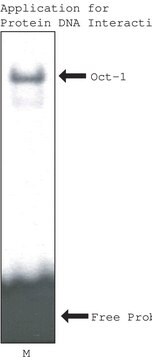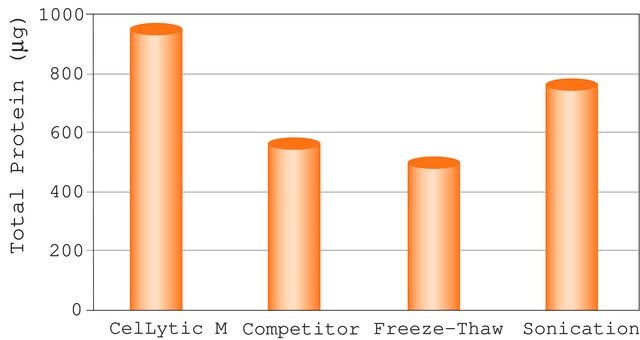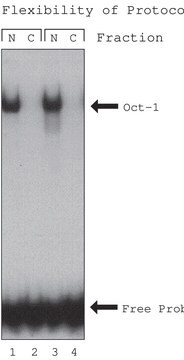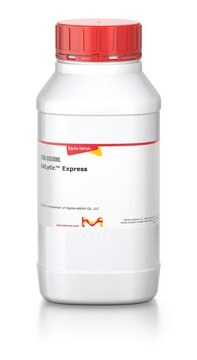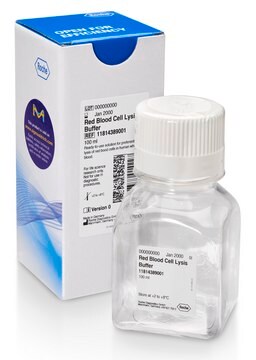MCL1
Mammalian Cell Lysis Kit
Synonim(y):
Odczynnik do lizy komórek
Zaloguj sięWyświetlanie cen organizacyjnych i kontraktowych
About This Item
Kod UNSPSC:
12352200
NACRES:
NA.56
Polecane produkty
zastosowanie
kit sufficient for 250 extractions (100 mm tissue culture plates)
Poziom jakości
metody
immunoprecipitation (IP): suitable
Warunki transportu
dry ice
temp. przechowywania
−20°C
Zastosowanie
The product contains all required reagents for the disintegration of mammalian cells and tissue for subsequent analysis of protein targets. Cellular proteins are stabilized during lysis and are suitable for immunoassays, immunoprecipitation, affinity purification and other functional assays.
Mammalian cell lysis kit was used to test the role of vascular endothelial growth factor (VEGF) receptor-1 and its ligand VEGF-B in motor neuron degeneration.
Mammalian cell lysis kit was used to test the role of vascular endothelial growth factor (VEGF) receptor-1 and its ligand VEGF-B in motor neuron degeneration.
Cechy i korzyści
- The kit can be used to prepare cell lysis buffer and other modified buffers
- The kit enables the researcher to change the buffer′s components to obtain maximum efficiency for a specific protein
Komponenty
The mammalian cell lysis kit is composed of solutions to be mixed and used for lysis of adherent cells, non-adherent cells, and tissues. It contains buffer, detergents, NaCl and protease inhibitor cocktail solutions.
Ta strona może zawierać tekst przetłumaczony maszynowo.
Elementy zestawu są też dostępne oddzielnie
Numer produktu
Opis
Karta charakterystyki
- P8340Protease inhibitor cocktail 2.5 mLKarta charakterystyki
Hasło ostrzegawcze
Danger
Zwroty wskazujące rodzaj zagrożenia
Zwroty wskazujące środki ostrożności
Klasyfikacja zagrożeń
Acute Tox. 4 Inhalation - Acute Tox. 4 Oral - Aquatic Chronic 3 - Eye Dam. 1 - Skin Irrit. 2 - STOT SE 3
Organy docelowe
Respiratory system
Kod klasy składowania
10 - Combustible liquids
Temperatura zapłonu (°F)
Not applicable
Temperatura zapłonu (°C)
Not applicable
Wybierz jedną z najnowszych wersji:
Masz już ten produkt?
Dokumenty związane z niedawno zakupionymi produktami zostały zamieszczone w Bibliotece dokumentów.
Klienci oglądali również te produkty
Jingfang Gao et al.
Cancer cell international, 14(1), 72-72 (2014-10-04)
Transforming growth factor beta (TGF-β) plays major roles in tumorigenesis by regulating cell growth, epithelial-to-mesenchymal transition (EMT), migration/invasion and metastasis. The epithelial markers E-cadherin, claudin-3 and claudin-4, commonly decreased in human adenocarcinomas are actually up regulated during ovarian carcinogenesis. In
L Martyniszyn et al.
Polish journal of veterinary sciences, 16(1), 25-32 (2013-05-23)
Autophagy is a self-degradation process of cellular components. It plays both antiviral and pro-viral roles in the life cycle of different viruses and the pathogenesis of different viral diseases. In this study, we evaluated autophagy induction in splenocytes of ectromelia
Shintaro Nakao et al.
The American journal of pathology, 178(4), 1913-1921 (2011-03-26)
Vascular adhesion protein-1 (VAP-1) contributes to inflammatory and angiogenic diseases, including cancer and age-related macular degeneration. It is expressed in blood vessels and contributes to inflammatory leukocyte recruitment. The cytokines IL-1β and vascular endothelial growth factor A (VEGF-A) modulate angiogenesis
Molecular imaging reveals elevated VEGFR-2 expression in retinal capillaries in diabetes: a novel biomarker for early diagnosis.
Sun D, Nakao S, Xie F, et al.
Faseb Journal (2014)
Shintaro Nakao et al.
Investigative ophthalmology & visual science, 54(6), 3830-3836 (2013-04-13)
Inflammation and immune cells regulate choroidal neovascularization (CNV) and could become therapeutic targets in age-related macular degeneration (AMD). Lymphangiogenesis is a key component of various inflammatory diseases. Whether lymphangiogenesis and lymph node-mediated immunity are involved in the pathogenesis of AMD
Nasz zespół naukowców ma doświadczenie we wszystkich obszarach badań, w tym w naukach przyrodniczych, materiałoznawstwie, syntezie chemicznej, chromatografii, analityce i wielu innych dziedzinach.
Skontaktuj się z zespołem ds. pomocy technicznej



